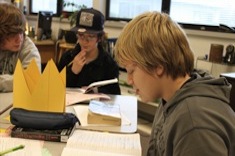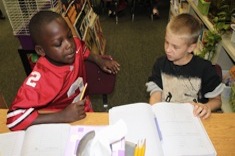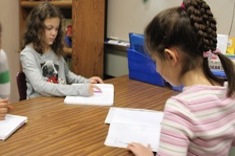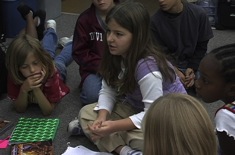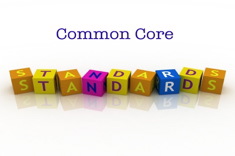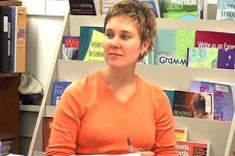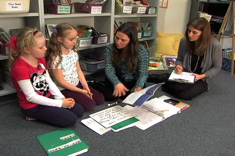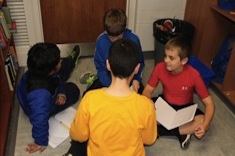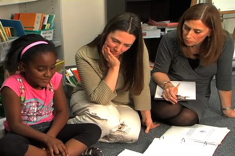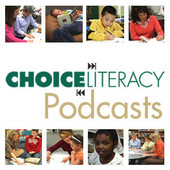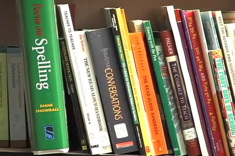Literacy Coaches
A simple question - who will coach the coaches? If you're a literacy coach, you already know there is no job more amazing or overwhelming in a school. Our Choice Literacy library includes a small sample of our resources for literacy coaches. If you work as a coach, you'll want a subscription that includes access to our Leaders Lounge, where there are over 900 resources for coaches, including study group protocols, videos of demonstration lessons, and guides for designing coaching cycles.
Latest Content
What’s the Most Beautiful Thing You Know About . . . ?
Ruth Shagoury and Melanie Quinn asked their colleagues to share the “most beautiful thing” about the puzzling student each of them is looking at closely in their study group. This is a great activity if you’re looking for a quick and easy icebreaker to spark some positive energy in your next study group or staff meeting and to remind everyone of the joys of our profession.
Putting the “Gradual” Back into Gradual Release of Responsibility
If it’s not sudden release of responsibility or no release of responsibility, what does gradual look like? Clare Landrigan and Tammy Mulligan bring this model to life.
Word Nerds
What words are worthy of study? Amanda Adrian and Heather Rader explore that question with colleagues.
Just-Right Poetry and Individualizing Instruction
Shari Frost describes how a sixth-grade teacher provides a range of poetry options to meet the needs of all students.
Peer Conferring: The Release Phase
Amanda Adrian concludes her series on peer conferring, analyzing the value of students working on their own after instruction and practice.
Thank You For Arguing
In the second installment of our teaching argument/opinion writing series, Heather Rader uses a continuum dialogue and modeled writing with intermediate students.
I Love a Good Argument
As Heather Rader works with teachers and teams on opinion/argumentative writing, she’s considering the anatomy of an argument and engaging ways to teach it.
Word Count
Ruth Ayres finds that keeping a word count is a potent way to increase writing quality over time.
Peer Conferring: The “Try It On” Phase
Amanda Adrian continues her series on how teachers can scaffold and model peer conferring. In this installment, Amanda uses the fishbowl technique with students.
Staying Child-Centered When You Work with Adults
Andie Cunningham shares challenges and practical strategies for how literacy leaders can stay child-centered.
Peer Conferring: The Modeling Phase
Amanda Adrian provides a framework, sample model lesson, and peer conferring guide for students to use as they learn how to respond to their classmates.
Conferring for Conventions (Conventions Series Part 5)
Heather Rader gives examples of convention conferences in this final installment of the conventions series.
Aligning the Common Core and Conventions Instruction (Conventions Series Part 4)
Heather Rader works with a team of intermediate teachers as they connect their plans for conventions instruction and the Common Core.
Between Inquiry and Instruction (Conventions Series Part 3)
Heather Rader works with a team of intermediate teachers as they pore over student work together and analyze which conventions should be taught.
Concise, Conversational, and Consistent: Explaining the Work of Literacy Coaches
Heather Rader shares the language she uses to describe literacy coaching to others.
Finding a Fit (The Power of Conventions Series)
Heather Rader works with a teaching team as they integrate conventions instruction into their writing workshop.
Introducing the Writing Common Core Standards: Planning for Professional Development
Heather Rader sorts through goals, audience, and interest in planning a day of professional development linked to the writing standards in the Common Core.
Loops and Blended Classrooms: Practical Tips to Start the School Year
It can feel like “old home week” when you have students returning to your classroom for a second year. But blending and looping both present their own special challenges during the first days of school. Melanie Quinn has advice for getting the year off to a good start.
Energy, Stamina, and Training Wheels for Coaching Teachers
Gradual release, not-so-gradual release or catch and release? Heather Sisson ponders the challenges of providing the appropriate support in a coaching cycle.
Discussing Observations with New Teachers
Jennifer Allen’s new teacher group discusses what they learn from classroom observations in this video taped early in the fall.
The ABCs of Literacy Coaching (Part 1)
Heather Rader shares the essential elements of successful literacy coaching in this first installment of a month-long series.
Ask Me – I’m Not the Expert
Heather Sisson explores the complicated links between relationships and expertise for literacy coaches and teachers.
Listen In: Strategies for Using Nonfiction Texts in Writing
The line between copying and plagiarizing can be a difficult one for young students to understand. In this video, Heather Rader and Linda Karamatic share a humane strategy for helping two second graders craft nonfiction writing.
What is the Content for Small-Group Instruction? (Part 2 of the Grouping Series)
Heather Rader considers how assessments and observations might be used to create flexible groups.
Listen In: About the Author
“About the Author” blurbs are a great way to bring closure to writing in workshops. In this “Listen In,” Myia begins to construct her “About the Author” page.
Listen In: Maya is a Chapter Writer
Some young writers take a lot of time and encouragement on the journey to uninhibited prose, while others zip to prolific. Maya is such a writer. Heather Rader assists this proficient 2nd grade writer as her teacher observes.
Literacy Groundings
Andie works with new teachers as they share their literacy groundings — the moments in their histories that shaped who they are as educators.
Tried and True Trumps Shiny and New
Amanda Adrian explains why running records are still an essential tool in any teacher’s assessment arsenal. She also includes links to web resources for honing your running record skills if they are a bit rusty.
Literacy Coaching and Student Work with Diane Sweeney (PODCAST)
Diane Sweeney talks about the importance of focusing more on student work and less on teacher plans and lessons for literacy coaches.
I Can’t Quite Put My Finger On It
Have you ever had a teacher enthusiastically embrace a new “magic bullet” instructional program that includes scripted or rote elements that concern you? Melanie Quinn considers this sticky situation instructional coaches sometimes find themselves in, and comes up with some starting points for conversations with colleagues.
Browse Content By
Type
Category
- Assessment Tools
- Big Fresh Archives
- Booklists
- Choice Numeracy
- Classroom Design
- Common Core
- Community Building
- Conferring
- Content Literacy
- Digital Literacy
- English Language Learners
- Equity
- Family Relations
- Free Samples
- Guiding Groups
- Leadership
- Literacy Coaches
- Mentor Texts
- Minilessons
- New Teacher Mentors
- Podcasts
- Poetry
- Quote Collections
- Reading Strategies
- Self Care
- Struggling and Striving Learners
- Talking and Listening
- Teacher Study Groups
- Teaching Reading
- Teaching Writing
- Word Study and Vocabulary
Author
- Melissa Quimby
- Nawal Qarooni
- Gwen Blumberg
- Julie Cox
- The Lead Learners
- Hannah Tills
- Josie Stewart
- Ruth Metcalfe
- Mallory Messenger
- Becca Burk
- Jodie Bailey
- Vivian Chen
- Mary Brower
- Tiffany Abbott Fuller
- Stephanie Affinito
- Ruth Ayres
- Leigh Anne Eck
- Heather Fisher
- Shari Frost
- Julie Johnson
- Suzy Kaback
- Gigi McAllister
- Shirl McPhillips
- Melanie Meehan
- Cathy Mere
- Debbie Miller
- Tara Barnett and Kate Mills
- Tammy Mulligan
- Dana Murphy
- Bitsy Parks
- David Pittman
- Brenda Power
- Heather Rader
- Matt Renwick
- Mandy Robek
- Christy Rush-Levine
- Gretchen Schroeder
- Jen Schwanke
- Brian Sepe
- Katherine Sokolowski
- Stella Villalba
- Jennifer Vincent
Grade Level
Choice Literacy Membership
Articles
Get full access to all Choice Literacy article content
Videos
Get full access to all Choice Literacy video content
Courses
Access Choice Literacy course curriculum and training




